Alexander: Sha’Carri Richardson vs Kamila Valieva, Racism in the Olympics
(Graphic by Sydney Stam | The Daily Utah Chronicle)
March 4, 2022
Beijing’s Winter Olympic Games have finally ended, but not without a fair share of controversy. At just 15 years old, Russian figure skater Kamila Valieva made headlines on Feb. 7 as the first woman to land a quadruple axel at the Olympics. Following an incredible performance, Valieva led her Russian Olympic Committee team to a gold medal. But days later, her triumph came crashing down. Olympic officials received word that Valieva was doping after she tested positive for a banned substance that increases endurance. Despite reports and an ongoing investigation, Valieva was still allowed to compete and skate for the ROC.
Two Cases, Two Decisions
The International Olympic Committee’s decision to let Valieva skate comes as a surprise, especially in comparison to Sha’Carri Richardson’s case. Richardson, the 21-year-old American sprinter favored to win gold during 2021’s Summer Olympics, received a 30-day suspension following a failed drug test. The drug in question? Richardson legally smoked marijuana following her mother’s unexpected death.
Valieva should not have been allowed to compete, per the standard imposed on Richardson. However, that obviously didn’t happen. Richardson herself called out the difference in treatment and punishment, tweeting “The only difference I see is I’m a young Black lady.” The IOC defended their decision by citing the differences in the competitors’ situations, but their differences fail to justify allowing Valieva to compete yet denying Richardson the chance to. If anything, the decision reflects the IOC’s racist view of Black competitors — especially Black women.
For Valieva, her drug sample included trimetazidine (TMZ), which has been banned in the Olympics since 2014. TMZ’s benefits include increasing endurance, reducing fatigue and greater oxygen efficiency. Valieva believed she had it in her system because of cross-contamination with her grandfather’s heart medicine. However, what makes her case highly unusual and suspicious is the presence of three substances in her sample.
TMZ enhances physical performance. Marijuana does not.
Russia’s Doping History
Russia has always had a doping problem with their Olympic athletes, to the point where the World Anti-Doping Agency banned the country from competing in 2019. Because of Russia’s past, Valieva’s situation is unsurprising. What’s unique about her situation is how the IOC allowed Valieva to compete while she was still under investigation. No Olympic athlete has ever been allowed to compete while under investigation for drug use. Allowing Valieva to compete sets a new precedent. Now, athletes who are suspected or accused of drug abuse can still compete if under investigation. Or maybe, only white athletes can.
Unfortunately, the Olympics has a racist history that reinforces the differential treatment between Valieva and Richardson. During the 2020 Tokyo Olympics, the International Swimming Federation banned swimming caps designed for natural Black hairstyles, citing it gave Black women a “competitive edge.” The Olympic governing body also imposed a rule on limiting naturally-occurring testosterone in women, which primarily impacts Black women. And when Naomi Osaka and Simone Biles chose to prioritize their mental health and well-being over their competitions, they were criticized and ridiculed. Historically and contemporarily, the Olympics exploits Black athleticism and Black women by imposing rules that are lingering byproducts of racism and sexism. By defending Valieva and protecting her but not Black women, the IOC sends a clear message — they do not support Black women athletes.
The issue at hand is not drug abuse. The IOC’s decision to allow Valieva to compete while banning Richardson was racist. If the issue really was about drugs, we would better monitor medicine and doping drugs, and the World Anti-Doping Agency would treat situations of drug abuse with equal sanctions and punishments. But it isn’t about the drugs. Richardson and Valieva proved that. There’s a stark contrast in how their situations were handled, and that contrast is race.
Right now, Black athletes are the ones pushing inclusivity and diversification of the Olympic games through protest and awareness. Athletes like Gwendolyn Berry, who advocates for Black activism and support, are spearheading the acceptance of Black athletes in high-profile sports. But instead of leaving this responsibility to Black athletes alone, the IOC and other Olympic committees need to work harder in supporting them. Whether it’s within a competition or outside of one, Black athletes need to be protected and supported just like their white counterparts. Or, in the case of drug abuse and doping, athletes should be treated equally and face the same repercussions, regardless of color.
I don’t expect the Olympics to resolve their racism problems instantly, but I expect far more effort from an institution that glorifies Black athleticism and profits off of it. Black women shouldn’t have to fight to prove they are worthy of respect. They deserve to compete and showcase their talents and hard work. It’s time we stop restricting their talents and abilities.










Christopher Joel Alexander • Apr 2, 2022 at 8:07 am
This is the opinion section.which is why she’s entitled to her opinion. The fact is Richardson substance was in no way performance enhancing. The other person’s substance was. Age, committee..it’s bull. If you’re competing in the Olympics make one committee and one rule that is fair and equally cited for the athletes across the board.
SFM • Mar 15, 2022 at 9:52 am
The IOC didn’t allow Valieva to skate, the Court of Arbitration of Sport (CAS) did. This article is embarrassing for the Chronicle. You can do better. I know you can because I used to be the Editor in Chief of this paper.
Tanner • Mar 15, 2022 at 6:56 am
I think I lost some brain cells reading this article.
Tom • Mar 8, 2022 at 6:36 am
If you don’t know anything about a topic, maybe you shouldn’t write a comment about it.
The main difference is the age. Under 16 you are a protected athlete, above not. There are many other differences, some of which were mentioned in the comments, but racism is certainly not one of them.
One can understand that Richardson feels disadvantaged, even if this is not the case. But as a journalist to simply take this on without proper classification not only shows poor work, but also harms the real fight against racism.
BM • Mar 6, 2022 at 3:10 pm
Thid is a terrible article. Even the first paragraph has lies. No one had landed a quadruple axel in competition. Already started out poorly. Don’t be a journalist if you’re not going to research your topic. Terrible job.
EAL • Mar 5, 2022 at 7:10 am
Richardson was banned by the USOC, not the IOC. The IOC wanted to ban Valiyeva but were forced to allow her to compete by the CAS. If Valiyeva had been an American the USOC would have banned her also. Racism has nothing to do with this story at all.